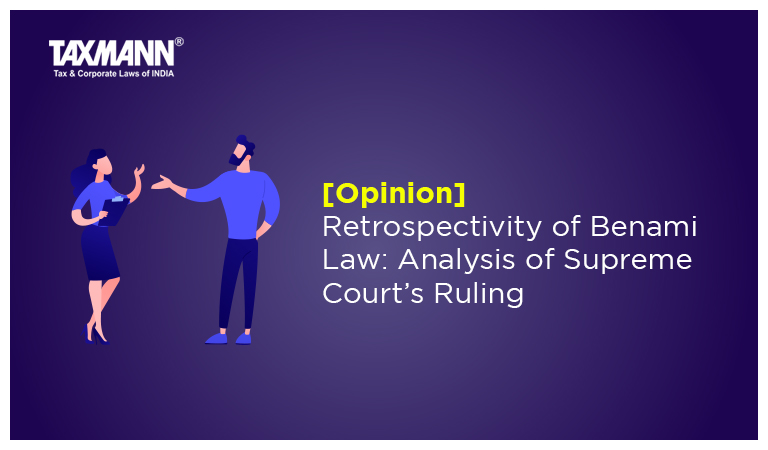[Opinion] Retrospectivity of Benami Law: Analysis of Supreme Court’s Ruling
- Blog|News|Income Tax|
- 3 Min Read
- By Taxmann
- |
- Last Updated on 31 August, 2022

Adv. Ruchesh Sinha, CA Anil Goel & CA Pawan Aggarwal – [2022] 141 taxmann.com 536 (Article)
1. Introduction
In the present article, analysis of the aforesaid judgment of the Hon’ble Supreme Court pertaining to the ‘Benami Act’ is made. The Hon’ble Supreme Court has pronounced a landmark judgment which is based on the tenets on which the constitution of our country is based, reaffirming the jurisprudence that “the law must be right, just and fair and not arbitrary, fanciful or oppressive”.
2. Case before the Hon’ble Supreme Court
Before moving further, the fact needs to be briefly recapitulated. In the present case the respondent company purchased a property on 2nd May 2011. Thereafter on 31st March 2012 (mind the dates), 99.9% of the shareholding of the respondent company was acquired by two entities namely M/s PLD Properties Pvt. Ltd and M/s Ginger Marketing Pvt. Ltd. The said shares were transferred at hugely discounted rates. The directors of the erstwhile respondent company and the subsequent purchaser company were common. Hence there was an apparent relation/connection. Accordingly the rigor of the Benami Transaction (Prohibition) Amendment Act, 2016 was invoked and the property was provisionally attached. The said attachment was also confirmed by the Adjudicating authority. The matter ultimately went to the Hon’ble High Court of Calcutta and the High Court held that the impugned notice and the impugned order are liable to be quashed for the main reason that the Benami Transaction (Prohibition) Amendment Act, 2016 does not have a retrospective operation. It was this issue as to whether the prohibition of Benami Property Transaction Act, 1988 (in short the ‘old Benami Act‘) as amended by the Benami Transaction (Prohibition ) Amendment Act,2016 (in short the ‘new Benami Act‘) has a prospective affect or retrospective affect.
3. Main Arguments of arguments by the UOI
The main thrust of the argument(s) put forward by the Government, in simple words can be stated as under:
(a) In the old Benami Act no machinery or procedure to effectuate with the Benami transaction was notified, hence the new Benami Act only brought in place the machinery and procedure for the same;
(b) It is not the offence which is being implemented retrospectively but merely the procedures are laid down to implement the old Benami Act;
(c) the old Benami Act already recognizes the Benami transaction as contrary to law and hence no substantive law is made out;
(d) confiscation is not a penal provision and has civil consequences and therefore the same can be applied retrospectively;
(e) the Parliament has the power to enact retrospective Legislation even in case of Criminal statute as long as it complies with article 20(1) of the Constitution of India.
4. Main Arguments of arguments by the assessee
The main thrust of the argument put forward by the assessee/respondent, in simple words can be stated as under:
(a) the old Benami Act did not make any provision to be applied retrospectively, much less stated in the new Benami Act;
(b) when the statute carves out distinct penalties in respect of Benami transaction entered into the un-amended regime vis-a-vis the Benami transaction entered into the after the new Benami Act, it clearly indicates that the subsequent amendment is prospective in nature;
(c) in the old Benami Act only the transfer of property was an offence however the new Benami Act has edit multiple other sections as offences under the category of Benami transaction;
(d) it is a settled law that any enactment which substantially affects the right of the people cannot be applied retrospectively and therefore, the new Benami Act is clearly prospective in nature.
Click Here To Read The Full Article
Disclaimer: The content/information published on the website is only for general information of the user and shall not be construed as legal advice. While the Taxmann has exercised reasonable efforts to ensure the veracity of information/content published, Taxmann shall be under no liability in any manner whatsoever for incorrect information, if any.

Taxmann Publications has a dedicated in-house Research & Editorial Team. This team consists of a team of Chartered Accountants, Company Secretaries, and Lawyers. This team works under the guidance and supervision of editor-in-chief Mr Rakesh Bhargava.
The Research and Editorial Team is responsible for developing reliable and accurate content for the readers. The team follows the six-sigma approach to achieve the benchmark of zero error in its publications and research platforms. The team ensures that the following publication guidelines are thoroughly followed while developing the content:
- The statutory material is obtained only from the authorized and reliable sources
- All the latest developments in the judicial and legislative fields are covered
- Prepare the analytical write-ups on current, controversial, and important issues to help the readers to understand the concept and its implications
- Every content published by Taxmann is complete, accurate and lucid
- All evidence-based statements are supported with proper reference to Section, Circular No., Notification No. or citations
- The golden rules of grammar, style and consistency are thoroughly followed
- Font and size that’s easy to read and remain consistent across all imprint and digital publications are applied



 CA | CS | CMA
CA | CS | CMA
